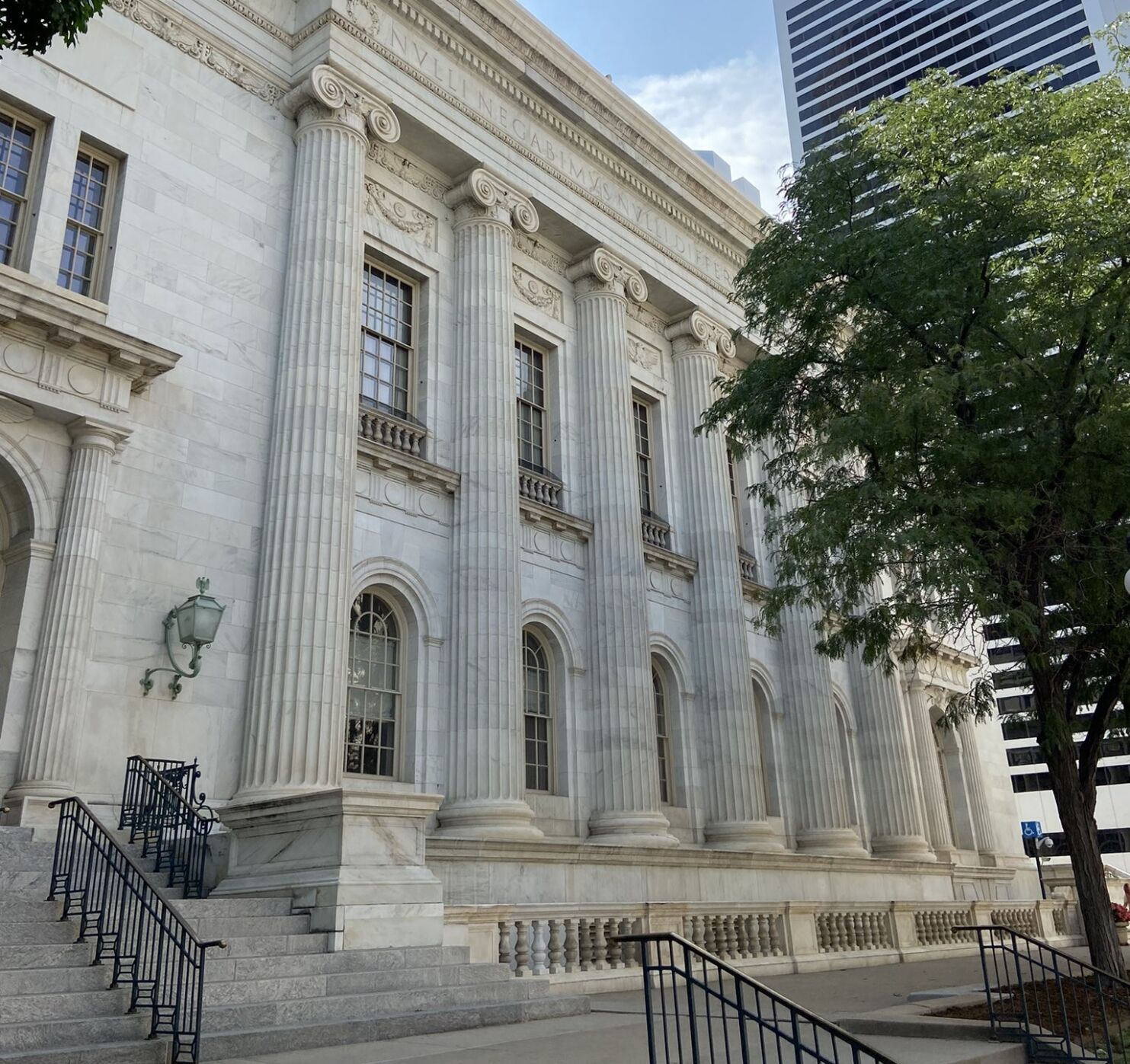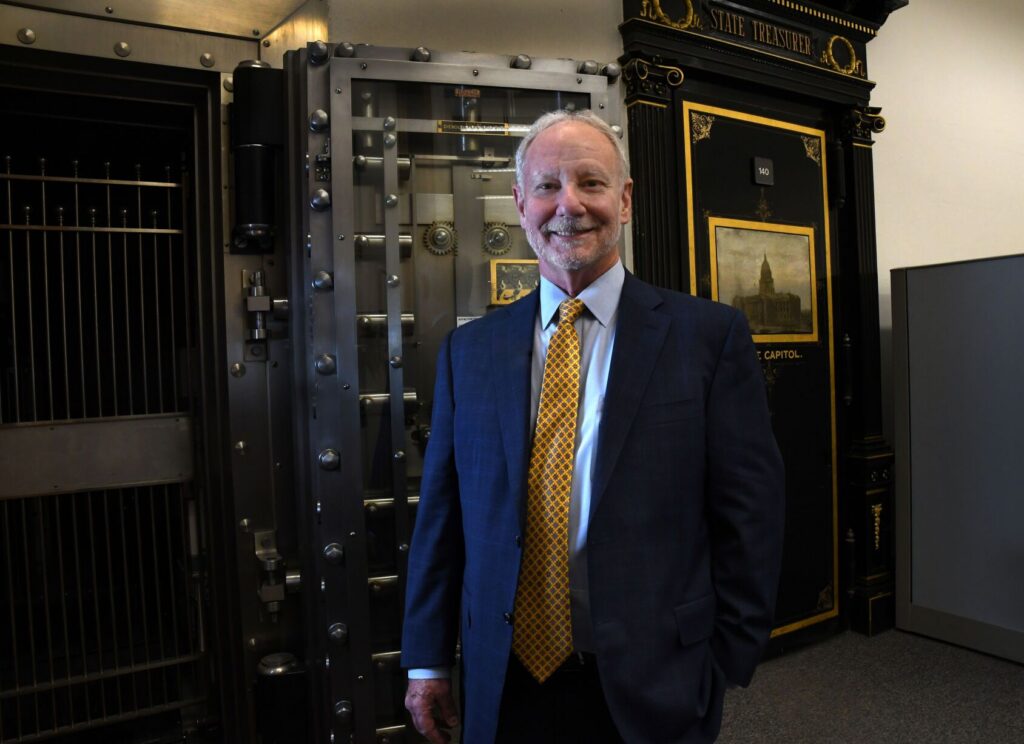10th Circuit overturns injunction on Denver’s homeless sweeps

By a 2-1 decision, the federal appeals court based in Colorado overturned a judge’s injunction that directed the City and County of Denver to provide ample notice of encampment “sweeps” to homeless residents.
The three-judge panel of the U.S. Court of Appeals for the 10th Circuit decided that the plaintiffs in the case – Denver Homeless Out Loud and several individual residents who experienced encampment clearings – had no ability to litigate their constitutional claim in the first place.
The majority reached its conclusion even though Denver itself had not raised that argument in its own defense on appeal.
Judge Carolyn B. McHugh, in the panel’s opinion, explained that the U.S. Supreme Court urges lower courts, under “special circumstances,” to consider whether parties are actually precluded from bringing civil claims. This was such a case, she concluded, due to a previous settlement agreement covering the same subject matter.
Judge Veronica S. Rossman, writing in dissent on Tuesday, disagreed with the majority’s choice to invoke the principle of claim preclusion in deciding the trial court had no authority to resolve the case of encampment sweeps. She called the move “particularly unusual,” “unprecedented” and a “mistake.”
“I have serious concerns, not shared by the majority, about whether the circumstances justify exercising our appellate discretion to raise claim preclusion,” Rossman wrote.
The plaintiffs filed their lawsuit in October 2020 alleging, among other things, that the city violated their right to due process under the law by conducting encampment clearings without proper notice, resulting in the unlawful seizure of their property. As part of their case, they asserted the city flouted a 2019 agreement, known as the Lyall settlement, that committed Denver to providing notice to encampment residents in advance of cleanups.
However, the Lyall settlement contained language precluding the plaintiffs from bringing claims for injuries “which may occur in the future” based on the encampment sweeps. The 10th Circuit’s majority believed those limitations encompassed the new due process claim as well, effectively rendering it off-limits to the courts.
Andy McNulty, the attorney representing the plaintiffs, did not see the terms of the Lyall agreement as supporting the majority’s interpretation.
“Holding as much is going to have negative broad-ranging impacts on civil rights litigation in this state and this circuit,” he said. “It’s not hard to imagine a court using this decision to preclude all prison-conditions cases after one settlement is entered into by a class of prisoners.”
In the October 2020 lawsuit, the plaintiffs outlined multiple instances of Denver reportedly giving same-day notice before sweeping encampments. Michael Lamb, who was residing in Lincoln Park on July 29, 2020, said the only notice he received was “waking up and seeing” city and state workers about to clear the park. The crew reportedly destroyed Lamb’s tent and other belongings before he could move them.
U.S. District Court Judge William J. Martínez ultimately found that, while the city did have legitimate public health reasons to clear the encampments, the actual reason for failing to provide notice was Denver’s desire to avoid “the possibility of additional (and vociferous) public scrutiny and the threat of First Amendment protected activity” via protesters showing up in support of encampment residents.
The judge issued an injunction requiring the Department of Transportation and Infrastructure to provide a seven-day notice before performing an “encumbrance cleanup” to clear public rights-of-way or “temporary area restrictions,” the name given to cleanups based on public health needs. He mandated that at least 48 hours’ notice be given in all instances. There were additional requirements to alert city council members and McNulty, the plaintiffs’ attorney, of sweeps.
As part of his order, unrelated to the due process claim, Martínez observed that, if the plaintiffs wanted to enforce the Lyall agreement, that was something only a state court could do.
The city appealed to the 10th Circuit, arguing the injunction hamstrung Denver’s ability to respond to public health emergencies. Even if an injunction were appropriate, the city added, Martínez exceeded his authority by imposing responsibilities on the city beyond the general seven-day posting of notice that the Lyall agreement requires.
The Denver City Attorney’s Office, two months after initiating its appeal to the 10th Circuit, did argue in a motion to dismiss the case that the Lyall agreement precluded the plaintiffs from bringing similar claims in a new lawsuit. However, the city did not raise that line of thinking to the 10th Circuit and Martínez has not yet ruled on the motion.
Nevertheless, the appellate panel’s majority undertook its own review of the Lyall settlement and cited one provision of the agreement releasing the city from any claims related to the practice of “sending ten or more employees or agents to clear away an encampment of multiple homeless persons by immediately seizing and discarding the property found there.”
The city’s conduct challenged in the most recent lawsuit “arises from the same municipal custom of sweeping homeless encampments at issue in Lyall,” wrote McHugh, an appointee of Barack Obama, for herself and Senior Judge Michael R. Murphy, a Bill Clinton appointee. “A precluded claim is, by definition, incapable of succeeding on the merits because the court is barred from resolving it.”
Because Martínez had determined that the plaintiffs would likely succeed on their constitutional claim, he had granted the injunction. If the Lyall agreement meant the plaintiffs could not litigate those allegations after all, McHugh concluded, they “cannot serve as the basis for a preliminary injunction.”
McHugh agreed with Martínez that state court was where the plaintiffs could seek to enforce the terms of the Lyall agreement. The panel’s majority did not pass judgment on Martínez’s finding that Denver likely violated the constitution with the encampment clearings.
Rossman, an appointee of Joe Biden who heard Denver’s appeal soon after joining the court, lamented that the majority’s decision effectively told Martínez to grant Denver’s motion to dismiss. She believed it would have been more appropriate to allow the parties to respond to the notion that the constitutional claim could not be brought, rather than decide it without warning.
“Appellate litigants should not be surprised by a final decision because they had no chance to present meaningful argument on the issue that this court, on its own, has decided,” Rossman wrote.
She also believed the majority could have asked Martínez to answer the question of claim preclusion, given his extensive handing of the case. Rossman pointed to the specific terms of the Lyall agreement and said she was not sure if, in fact, they blocked the current lawsuit against Denver.
“What does ‘clear away’ mean?” she asked. “Further, what does ‘encampment’ mean? … (T)he Lyall settlement agreement is at best ambiguous, making the claim preclusion question here unsuitable for resolution.”
The majority maintained that Lyall settlement’s preclusion language applies, rejecting the plaintiffs’ arguments that the cause of action in Lyall and in this case are distinct. The plaintiffs notably argued that the homeless sweeps have materially changed since the agreement, and they also alleged an Eighth Amendment violation.
McNulty said he is considering an appeal of the panel’s decision to the full roster of 10th Circuit judges. Despite the opinion, he said the remainder of the plaintiffs’ lawsuit seeking damages for the seizure and destruction of property would proceed, at least until Martínez rules on the motion to dismiss.
Since the injunction in January 2021, McNulty indicated the city has not conducted any encampment clearings without warning to residents.
“That tells you that from the beginning, there never was any public health and safety justification for sweeping encampments with less than seven days’ notice,” he said.
A spokesperson for the city attorney’s office said Denver is pleased with the decision and would “continue to honor its commitments as set forth in the Lyall settlement agreement we previously entered into.”
The case is Denver Homeless Out Loud et al. v. City and County of Denver et al.
Editor’s note: This article has been updated to include the city’s response to the decision.














